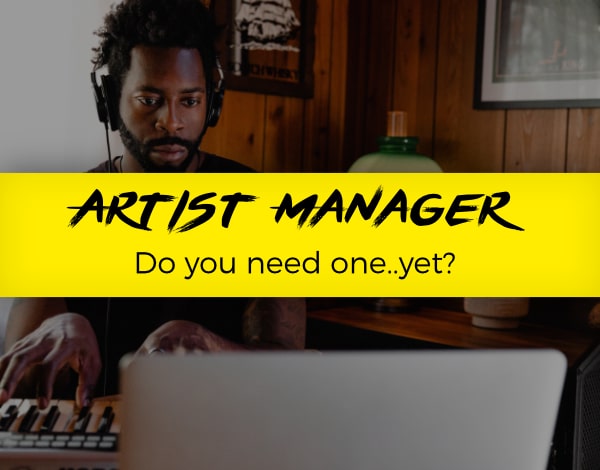You would probably pumped to get an artist manager on your team to help you take the next steps in your career.
We will go over what exactly an artist manager or personal manager does to help their client, a band or artist, expand their career and grow.
But first, let’s talk broadly about what an artist manager is…
What is an Artist Manager? An Artist Manager or personal manager is the single most important member of your professional team when building a career in music. The manager handles the general business operations for his artist, but often the relationship goes much deeper. The manager helps guide an artist to their full potential and be their perennial “champion”.
I am sure you have heard at least a few stories about the managers behind some of the most legendary musicians – some good and some bad. But the truth is most superstar artists wouldn’t have made it to the heights of fame that they did without the help of someone just as talented in the role of their artist manager. Even The Beatles considered their artist manager, Brian Epstein, an honorary member of the band.
There are still a lot of questions about the role of an artist or personal manager in the modern music industry. Let’s break down what exactly to expect from a manager and how to find one.
What does an Artist Manager Do?
An Artist manager is a role of many hats – handling everything from personal to business tasks for the artist. Mentor, psychologist, mentor, and friend are all names that would be fitting for a great artist manager. They have a lot of responsibilities, especially if they are working with a budding or low-level artist as they are usually the first member of an artist’s team. Here are a few key responsibilities:
- Advising with business decisions. They will help you decide what record company to sign with — if you even decide to, or what publishing or media deal is good or not.
- Mediator. The manager should also act as a buffer between the artist and the rest of world. This lets them be shielded from the media inquires and requests that can disrupt their focus on the art of making music.
- Money Management. The artist manager will generally handle this job until hiring a separate business manager becomes necessary when the artist’s career begins to grow.
- Promotion and Marketing. A good manager will promote your music to help get you featured on playlists, blogs, and other publications.
- Artist Development. The manager should be there to help you grow as an artist. They will handle the business side of things leaving you, the artist, with more mental capacity to be creative. Helping to decide what songs should put on the album, or selecting the producer, photographer, and videographer can have a creative impact as well.
- Touring.
People get degrees in learning about the music business, and you can find a lot of information about the roles and skills of this career path. It might even help you to pick a manager when the times comes. Check out the article about the Role of an Artist Manager.
How much do artist managers charge?
Managers generally get from 15% to 20% of earnings from new and emerging artists. More established artists have a little more negotiating power. This comes out of gross earning, which basically means it is the total amount of money you make before calculating all of your expenses.
Another important thing to remember is that managers do not get paid until you do. So, if someone is scouting you out and they ask you to pay them up front for them to manage you, that is a huge red flag.
The book All You Need To Know About the Music Business goes into great detail about how to hire a manager, what to expect when negotiating, and different stipulations on when and if managers can get paid. It a necessary read for any musician.
NOTE: You can check out my other book recommendations in this article: The 5 Best Books For Musicians
Do You Need An Artist Manager….yet?

Artists just starting out often think that getting a manager will be the magic bullet to help them take the next step in their career, but that is often not the case. In the past, a manager’s contact list and ability to network make them very valuable, but in the digital age, where an artist and easily communicate with labels, build a following on social media, network with promotion channels on their own, the amount of benefit has sharply decreased in most cases.
However, if you are an emerging artist and you got your artistic vision and direction on point then a good manager can bring in a lot of value when you are ready to brand yourself even further. At this stage, The manager should be getting your interviews with podcasts/blogs/radio, sending out EPK to promoters and venues to land you shows, helping you reach out to new artists to collaborate with and a ton of other stuff.
If you are still discovering yourself as an artist or finding your niche or fanbase to say, I would recommend handling as much of the business side of things as you manage until you gain more clout as an artist.
There are plenty of resources and information to help you manage the business and promotion side of things. Jumping in and understanding the business and promotion will help you down the line. You won’t be totally clueless about what exactly your manager is doing to help and you will be able to quickly realize if it is good or just dead weight on your team.
So here is the take away...
The managers job is to take care of all the things you don’t have the time for or don’t have the experience or connections to do.
When you are first starting out, you can do most of this yourself — unless you are too lazy to learn — you can handle the distribution, booking your first local gigs, and promotion on your own at this stage. Save your money and gain experience until you are further down your journey.
How To Find The Right Artist/Personal Manager
Finding the right artist manager is going to really depend on where you are at in your career. If you are just starting out and not earning much or anything, then it will be extremely hard to find an experienced manager that will be willing to work with you. Unless, they decide that you have to potential to make it and are worth the risk.
So let’s break this down into how to find a manager at different stages of your career.
Emerging Artists/Bands
You are probably still finding your fanbase or have a small following in your local area or in online communities. You are probably not making much or anything from your music yet. If this is the case, you are probably going find a young, inexperienced manager who has the drive and passion and believes in your music.
This kind of person is probably in making in the music business as well so they are going to work their ass off to help promote you and get your name out into the world. Remember, he doesn’t make any money unless you do — you can bet he/she will trying to make that happen.
One of these people might be among your fanbase or even a loyal friend, as is often the case with new artists.
Mid-Tier Artists and Higher
You are probably already playing a lot of gigs in your regions, but haven’t done an official tour yet. You are probably making money from merch and shows at this point. Up until now, you have been handling promotion and booking your own shows, you are starting to get some traction.
At this point, managers will probably start looking for you. You will have to pick manager the best for your situation, decide who can provide the most benefit, and will be easiest to get along with.
If you are starting to take off, then there may be a lot of people contacting you telling you that you need a manager. They will generally oversell how badly you need this so that they can be the first to jump on the money pot.
TIP: Avoid any manager that says you need to pay them up front. This is a scam. The manager doesn’t get paid until you get paid.
If you haven’t been contacted by a potential manager and you need to get a manager to help take you to next step then, you could start contacting other mid-sized or regional artists that you have a relationship with to see if they have any recommendations.
They may have a manager that they worked with previously or their manager is open to taking on more acts.
Basically, the more contacts you have in the industry such as people working at record companies, publishing companies, bloggers, booking agents, the easier it will be to find recommendations.
There are a few resources online that have created a directory of music industry contacts. Pollstar magazine’s Management Directory is a list of major artist management companies for a premium price. I am sure you can find similar information with enough googling.
Paul Allen, who wrote a book about artist management, also provides a list of some major artist management firms as well as a few smaller firms on his website. It is worth checking out as well.
Related Questions
Does an independent artist need a manager?
Most independent artists will need to have a manager, but there is very little need to get one too early in your career. An independent artist should already be somewhat established and making money in the industry before they active seekout a manager. However, if you have a loyal friend or a superfan that is interested in the music business, they can assist you with the day to day tasks of music promotion and marketing.
Conclusion
There is a right time to in your career to pick up an artist manager — too early, and no one will want you. You need to take your music career through A,B, C,D, E, F, and G. A manager will help you take you through to Z. The first steps depend on you, don’t be lazy about it.
Learn about music marketing and promotion and you can do yourself. Start networking with people online and in your scene in a honest way.
What do you think about getting an artist manager? Do you have one?
